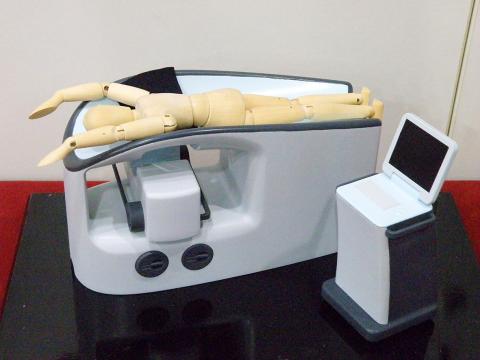The Institute of Nuclear Energy Research yesterday unveiled a new technique using positron emission tomography (PET) for more precise and comfortable scanning for breast cancer.
The institute said the first locally developed PET instrument solely dedicated to breast cancer screening possessed the advantages of accuracy, comfort and lower cost compared with current screening tools.
The device can be used to screen for preliminary breast cancer as well as to track following treatment for breast cancer.

Photo: Tang Chia-ling, Taipei Times
Breast cancer is the second-leading cause of death globally and the leading cause of death among Taiwanese women. The incidence of breast cancer in Taiwan is the second-highest in Asia, said Jan Meei-ling (詹美齡), a researcher at the institute.
CURRENT PROCESSES
Mammography is the currently recognized procedure for screening breast cancer in Taiwan, using low-energy X-rays to examine the breasts, said Tzen Kai-Yuan (曾凱元), director at National Taiwan University Hospital’s Department of Nuclear Medicine. If suspected masses are found, a cell or tissue sample is then taken for a biopsy, he said.
However, Asian women tend to have less fat in their breasts and higher breast density, making it more difficult to effectively screen breast cancer through mammography, which often leads to erroneous diagnoses, Jan said, adding that several women complained about the pain caused by mammography screening and feared having a biopsy.
SAFETY, AFFORDABILITY
Although the magnetic resonance imaging (MRI) technique or a conventional whole-body PET are sometimes used for improving diagnoses for breast cancer during second-phase screening, the cost of an MRI and the radiation dosage of traditional PETs are still relatively high compared with the newly developed breast PET, Jan said. Both tools also have lower accuracy, she said.
The institute said the new PET screening instrument would cost only one-fourth to one-sixth of an MRI and could reduce up to 70 percent of the radiation dose used in a conventional whole-body PET.
Moreover, a research study on breast PET in the US last year showed it could increase screening accuracy by 26 percent.
The institute estimated that more than 30,000 women in Taiwan would benefit from the new technology and avoid an unnecessary biopsy.
Thorough evaluations by the Department of Health and hospitals will be required before the device is employed in hospitals for regular use, Tzen said, adding that he estimated four or five years would be needed before it is adopted.
The institute said it was optimistic about the development of the new instrument, saying that all the components were made by local manufacturers and could have a positive impact on technological development.

US climber Alex Honnold is to attempt to scale Taipei 101 without a rope and harness in a live Netflix special on Jan. 24, the streaming platform announced on Wednesday. Accounting for the time difference, the two-hour broadcast of Honnold’s climb, called Skyscraper Live, is to air on Jan. 23 in the US, Netflix said in a statement. Honnold, 40, was the first person ever to free solo climb the 900m El Capitan rock formation in Yosemite National Park — a feat that was recorded and later made into the 2018 documentary film Free Solo. Netflix previewed Skyscraper Live in October, after videos

NUMBERS IMBALANCE: More than 4 million Taiwanese have visited China this year, while only about half a million Chinese have visited here Beijing has yet to respond to Taiwan’s requests for negotiation over matters related to the recovery of cross-strait tourism, the Tourism Administration said yesterday. Taiwan’s tourism authority issued the statement after Chinese-language daily the China Times reported yesterday that the government’s policy of banning group tours to China does not stop Taiwanese from visiting the country. As of October, more than 4.2 million had traveled to China this year, exceeding last year. Beijing estimated the number of Taiwanese tourists in China could reach 4.5 million this year. By contrast, only 500,000 Chinese tourists are expected in Taiwan, the report said. The report

Temperatures are forecast to drop steadily as a continental cold air mass moves across Taiwan, with some areas also likely to see heavy rainfall, the Central Weather Administration (CWA) said. From today through early tomorrow, a cold air mass would keep temperatures low across central and northern Taiwan, and the eastern half of Taiwan proper, with isolated brief showers forecast along Keelung’s north coast, Taipei and New Taipei City’s mountainous areas and eastern Taiwan, it said. Lows of 11°C to 15°C are forecast in central and northern Taiwan, Yilan County, and the outlying Kinmen and Lienchiang (Matsu) counties, and 14°C to 17°C

STEERING FAILURE: The first boat of its class is experiencing teething issues as it readies for acceptance by the navy, according to a recent story about rudder failure The Hai Kun (海鯤), the nation’s first locally built submarine, allegedly suffered a total failure of stern hydraulic systems during the second round of sea acceptance trials on June 26, and sailors were forced to manually operate the X-rudder to turn the submarine and return to port, news Web site Mirror Daily reported yesterday. The report said that tugboats following the Hai Kun assisted the submarine in avoiding collisions with other ships due to the X-rudder malfunctioning. At the time of the report, the submarine had completed its trials and was scheduled to begin diving and surfacing tests in shallow areas. The X-rudder,